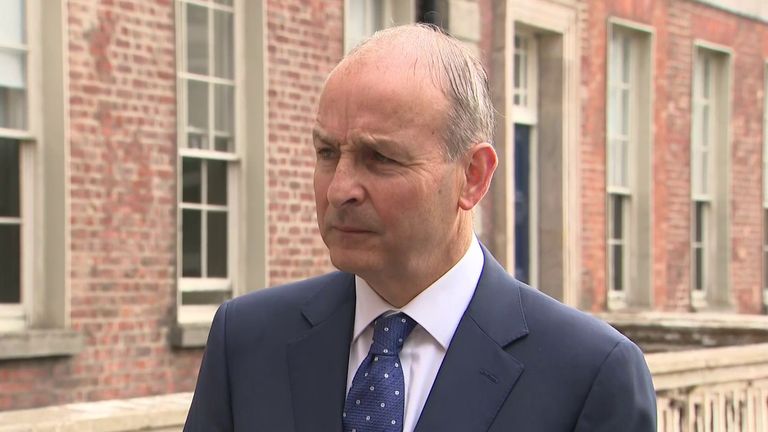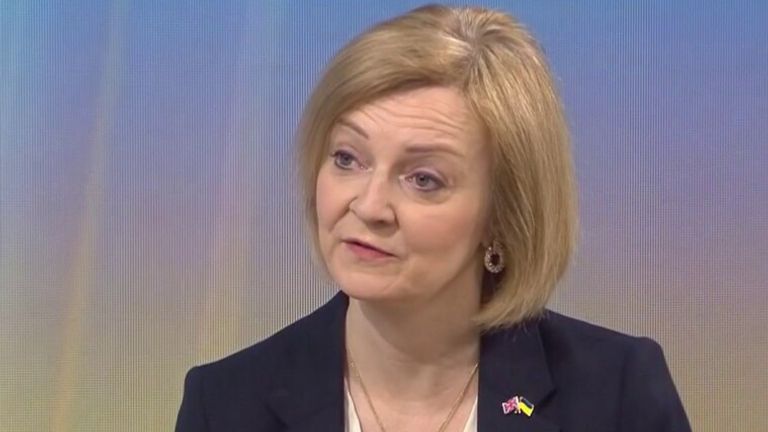[ad_1]
Britain’s decision to tear up the Northern Ireland Protocol is “astonishing many people around the world”, Ireland’s Europe affairs minister has told Sky News.
Thomas Byrne said the move, which he said was “breaking international law”, would cause “reputational damage” and suggested it could encourage other nations not to comply with their treaty obligations.
Labour accused the government of pressing “the nuclear button” over the protocol. Irish Prime Minister Micheal Martin said it was a “fundamental breach of trust”.
Politics Hub: Truss challenges critics of Rwanda deportations to come up with alternative
It comes as Brussels threatens legal action after the UK government published legislation which will override the protocol – the post-Brexit deal that governs Northern Ireland’s trading arrangements.
The protocol is designed to prevent the return of a hard border with the Republic of Ireland but effectively creates a border in the Irish Sea and means exports from Britain are subject to customs checks.
The UK says that creates problems for businesses and is a threat to the power-sharing arrangements set up after the Good Friday peace agreement in 1998 – with the DUP refusing to support a new Northern Ireland government until the issues are resolved.
Foreign Secretary Liz Truss told Sky News that the “unintended consequences” of the protocol – a deal that was signed by Britain – meant it had to act, with the situation “gradually getting worse”.
“That’s why the government’s determined to act and we’re doing so in a reasonable way,” she said.
Ms Truss told Times Radio: “Our solution doesn’t make the EU any worse off.
“So there is absolutely no reason why the EU should react in a negative way to what we’re doing.”
But Mr Byrne said: “There’s no doubt that it is astonishing many people around the world that Britain would sign a treaty and then decide not to comply with it.
“This is particularly the case when there has been a stream of negotiation there, papers produced by the European Commission to try to resolve some of the issues under the protocol.
“But the idea that you just walk away from your treaty obligations I think is really unprecedented and it’s not just that Britain has done this.
“I have no doubt that other countries which may not be as committed to democracy and the rule of law as Britain is and are looking at what Britain has done, maybe they’ll reconsider treaty obligations.
“Why shouldn’t they if Britain does this, if Britain breaks the law?”
Labour’s shadow culture secretary Lucy Powell warned of the damage that could be caused to Britain’s relationship with Europe.
She told Sky News: “We don’t want to start some kind of trade war – because we’ve pressed the nuclear button to say an agreement we signed up to only a few months ago we now want to renege on.
“That doesn’t show us in a very good light internationally, just at the point when we’ve got a cost of living crisis in this country, problems with supply chains, problems with food imports, energy imports.
“We don’t want to make that worse right now.”
The bill will enable ministers to establish a “green lane” so trusted traders are allowed to move goods from Great Britain to Northern Ireland without checks, as long as the products remain within the UK.
Goods supplied by firms outside the trusted trader scheme, or products destined for Ireland and the EU, would go through a red lane and face checks.
In a legal policy paper published alongside the bill, the government states the move is justified under international law because of the “genuinely exceptional situation”.
The European Commission’s Vice President Maros Sefcovic said the EU viewed the UK’s actions with “significant concern” and that it would consider what steps to take next.
He said this would begin with the resumption of legal proceedings against the UK, which it suspended in September, over breaching the withdrawal treaty of 2020.
As well as restarting infringement proceedings against the UK, he said the EU would also look at launching further legal action to protect the integrity of the EU single market, as he ruled out renegotiating the trade protocol.
[ad_2]











